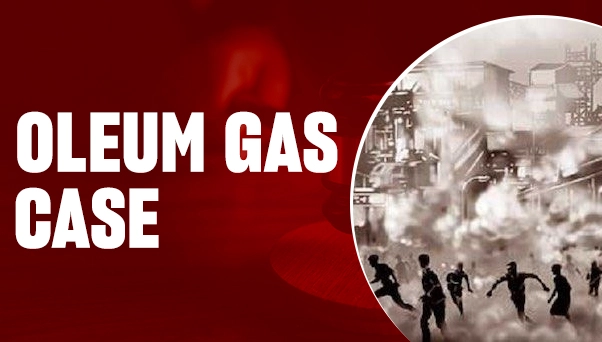In 1986, in an important legal case which is known as MC Mehta vs. Union of India (Oleum Gas Leak Case) the Supreme Court of India changed the environmental law in the country in a major way. The court introduced the "Absolute Liability" principle with this case. This principle means that dangerous industries are responsible for any harm they cause, even if there was no negligence.
Background
Two oleum gas leaks happened in Delhi that gave rise to this case. The first incident took place in December 1985 at Shriram Food and Fertilizers Ltd., owned by Shriram Industrial Enterprises. A minor second leak occurred a day later. These leaks resulted in several people getting injured. A lawyer died from a lung condition caused by the gas leak. The 1984 Bhopal Gas Tragedy was an enormous industrial disaster. It raised awareness about chemical plant dangers. People realized these places can be very risky. After Bhopal, events showed we need strict safety rules for chemical companies as the risks were severe. The tragedy served as a stark reminder of the far-reaching consequences when safety protocols fail, prompting authorities and communities to adopt a more vigilant stance.
Legal Proceedings
An environmental crusader, MC Mehta, initiated Public Interest Litigation (PIL), demanding the plant's closure and compensation for victims. India's apex court scrutinized the case, evaluating a hazardous industry's accountability for accidental harm. The court weighed the extent of liability for an enterprise operating in a risky or inherently dangerous sector, causing injury through an accident. Taking charge and facing results. The verdict given by the Supreme Court bench involving Justice P.N. Bhagwati really shook things up. The ruling was unprecedented, groundbreaking - a real It introduced the concept of Absolute Liability. This means a company involved in hazardous activities has a complete and nontransferable duty to ensure no harm results from its operations. If any harm occurs, the company must provide compensation, regardless of whether the harm was caused by negligence or any other factor. The liability is not subject to any exceptions under the traditional strict liability doctrine, as established in the English case of Rylands vs. Fletcher (1868). The judicial system commanded Shriram Foods and Fertilizer Industries to provide restitution to those impacted by the gas emission, signifying a pivotal instance in executing the doctrine of unconditional accountability for environmental harm.
Key Takeaways
1. Unconditional Responsibility: This landmark decision enforced the doctrine of absolute liability, clearly stating that industries engaged in inherently hazardous operations cannot claim exemptions under the strict liability rule.
2. Environmental Consideration: The court said protecting nature was vital. Companies must keep communities and surroundings safe.
3. Expansion of Article 21: This case widened Article 21's meaning in India's Constitution. The right to life now includes the right to a healthy environment.
4. Precedent for Future Cases: This ruling set important standards for later environmental cases in India's legal system.
The case of MC Mehta vs. Union of India was a big deal for the environment in India. The judges took a firm stand and decided companies must be held responsible if they damage the environment. This ruling was very important as it showed the courts were serious about protecting nature. Companies that pollute or harm the environment would face consequences subsequently.
